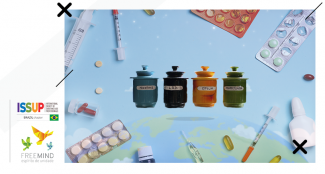With the pandemic, what has changed in drug use?

With many drug users dealing with mental health issues such as depression and anxiety, coronavirus isolation presents an unprecedented challenge.
With the advancement of isolation measures to try to contain the new coronavirus, some illegal drug users have started to stock up on their preferred substance to avoid shortages during the period when they cannot leave their homes.
But the consequences could be devastating, warn experts concerned that they could adopt riskier habits — such as using drugs they are unfamiliar with or abstinence, which can be dangerous if left unchecked.
As international borders close and supply routes for these substances are disrupted, they will become scarcer, and with it, the price will increase, or the portions of drugs will be reduced, without the appropriate reduction in prices.
If a particular drug is not available, users are likely to replace it with another: alcohol, inhalants, benzodiazepines, or whatever.
Another problem that can occur with the scarcity of a certain substance is that the purity of this drug must drop and other materials must be added to it that can further compromise the health and life of its users.
In addition, there may be a change in the methods of drug consumption, with the addict using, for example, injectable drugs or even making lethal combinations of substances with the possibility of overdoses.
Mixed consumption of marijuana and alcohol has already seen a significant increase worldwide in recent weeks, as they are much easier substances to find.
According to a study carried out by the Observatory of Addictions and Problematic Consumption of the Ombudsman of the province of Buenos Aires (1), almost 21% of the 506 interviewees, who have been consuming substances since before the quarantine, acknowledged that this practice has increased in the country in recent weeks. The highest indicators are found among those who drink alcohol (36.5%) and smoke tobacco (40%), followed by those who use antidepressants or anxiolytics (10.1%). They recommend strengthening the implementation of public outreach and outreach campaigns that have already been initiated by national and provincial health agencies in Argentina.
Other conclusions of the study, carried out through an online platform in the first week of April with 506 people over 18 years of age living in the province of Buenos Aires, indicated that 48% of those who tried new substances recognize that it will be very difficult to stop the consumption of alcohol, tobacco and antidepressants. The fact that, in a context in which it is vitally important to maintain tolerance and peaceful coexistence within homes, the use of substances negatively affects interpersonal relationships was also mentioned.
Almost 30% of those surveyed, i.e. 1 in 3, admit that their mood was altered – profoundly or moderately – during the emergency. "We must keep in mind that the consumption of psychoactive substances can be, in many cases, an individual adaptive response that seeks to alleviate or overcome the situation of stress resulting from social confinement. Thus, we are witnessing a paradoxical situation: individuals under stress resort to substance use and the result of such action turns out to be greater stress, which, in turn, leads to situations of conflict with other individuals with whom they share social isolation," concluded one of the researchers.
It should also be kept in mind that people who smoke and/or inhale substances have greater risks in the Covid-19 pandemic, risks that are added to the many already known about smoking/vaping, excessive alcohol consumption and the use of narcotics.
At the global level, there is a practically widespread consensus among professional associations, organizations, and scientific societies that efforts should be redoubled, in this pandemic context, in the development of prevention, awareness, and addiction care campaigns.
The psychoanalyst and commentator of Rádio Metrópole, Marcelo Veras, warned about the risks involved in the use of alcohol, drugs and medicines as a resource to support isolation in the coronavirus pandemic. In an interview (2) with Mário Kertész, on March 22, 2020, Veras stated that in extreme situations like this, it is necessary to learn to deal with suffering instead of using substances as an escape valve.
"If we rely too much on medication, alcohol and drugs to endure difficult things, when something very difficult really appears, we no longer have the tools to be able to react. (...) Often, what we need is to know how to endure this," he said.
In Veras' assessment, in addition to highlighting the loneliness of modern society, the pandemic forces people to reframe the meaning of their actions. "At this moment, we have to rely more and more on the devices of culture to transcend the simple banality of everyday existence. It's impressive, after the first week of confinement, we look at the closets and see how many things we don't need. (...) Some people thought that there was no life beyond the clubs, the cults, the consumption; This moment is important as a life drive," he said.